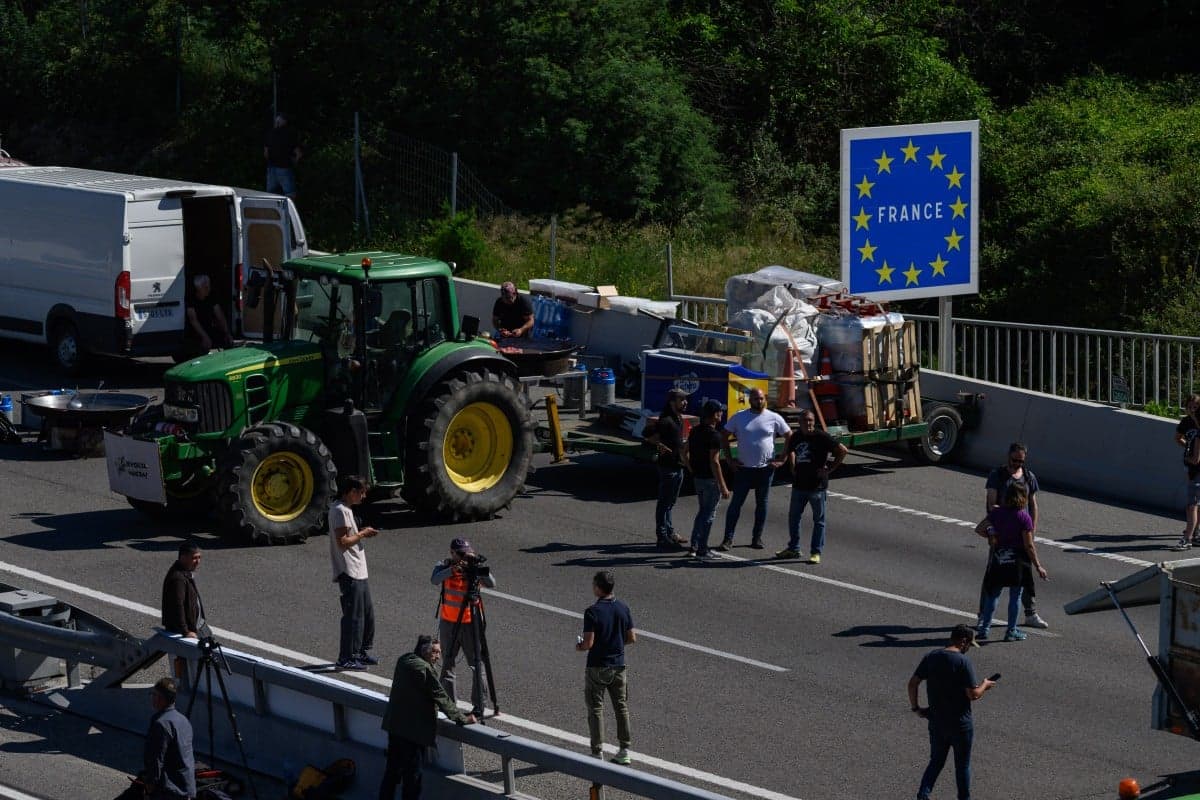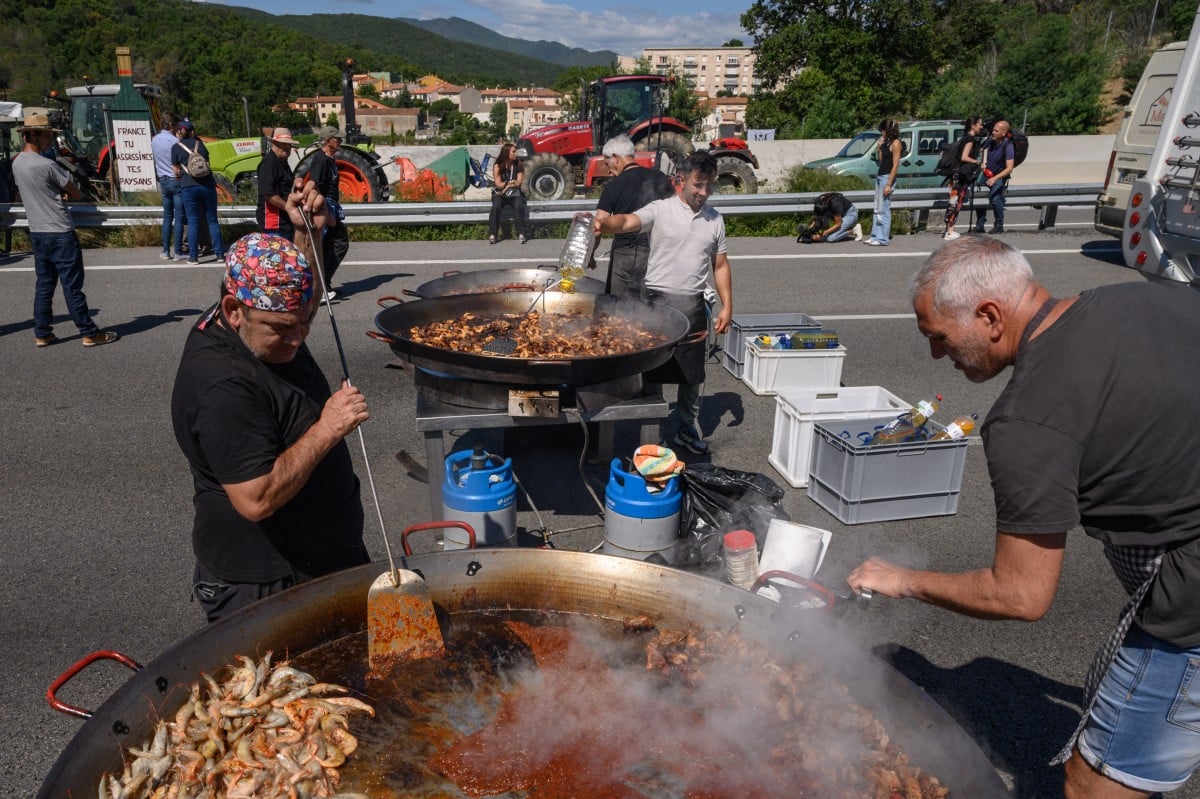Farmers' blockades along French-Spanish border begin to break up

Two roads remained blocked in south-west France and north-east Spain on Tuesday morning, after farmers protested ahead of the European elections along several crossing points at the border on Monday.
Farmers reprised the road blockades seen at the start of the year on Monday, with the intention of raising their concerns ahead of the European elections.
The joint action by French and Spanish farmers began early on Monday, targeting highways and crossing points on the border.
As of Tuesday morning at 7am two motorways remained blocked, namely the A9 Montpellier-Barcelona motorway in both directions and the A63 Bordeaux-Bilbao motorway in the France-Spain direction, according to Vinci Autoroutes.
Other blockades, including the one along the Pont de Rei, in France's Haute-Garonne département, were lifted on Monday evening.
The two remaining blockades were expected to break up by mid-morning on Tuesday. Jérôme Bayle, a lead figure in the agricultural protest movement in France, told French media that "they are going to leave. It will be over at the latest by 10am."
In total, eight crossing points, as well as toll booths, between France and Spain were blocked on Monday - mostly located in the Pyrenees, spanning from Catalonia to Basque Country.
Images began to circulate of one of the blockades - which had been located along the autoroute at Le Perthus, near Perpignan, as farmers set up giant pans to cook lunch for their fellow protesters.

Cooks prepare food as French and Spanish farmers block a highway on the border between Spain and France, at Le Perthus near Perpignan on June 3, 2024. Photo by Ed JONES / AFP
The action has largely been organised on a local level without the involvement of the major farming unions.
Huge protests from farmers succeeded in bringing large parts of the French road network to a halt in January and February, but were halted after a series of promises from the French government.
However, many of the issues that farmers complained about are decided at an EU level, hence the renewed protests ahead of voting for the European elections, which takes place between June 6th and 9th.
"When I talk to the government, they tell me that 80 percent of agricultural legislation is decided in Brussels, so we've understood that the battle is no longer national, it's European,” said Jérôme Bayle, a cattle farmer from Haute-Garonne who became a figure in the agricultural protest movement at the beginning of the year.
"We're not asking for the earth, just for Europe to be standardised in terms of regulations and taxes."
The French-Spanish border became a flashpoint for protests at the start of the year, with French farmers complaining that cheaper Spanish imports undercut their produce - several Spanish lorries were seized with their loads burned.
However this protest had the support of some Spanish farmers, who have organised coordinated protests via Telegram groups.
One group calling itself Revolta Pagesa (Peasant Revolt) is a Catalan group that says it is fighting "in defence of the land” and “for food sovereignty".
Comments
See Also
Farmers reprised the road blockades seen at the start of the year on Monday, with the intention of raising their concerns ahead of the European elections.
The joint action by French and Spanish farmers began early on Monday, targeting highways and crossing points on the border.
As of Tuesday morning at 7am two motorways remained blocked, namely the A9 Montpellier-Barcelona motorway in both directions and the A63 Bordeaux-Bilbao motorway in the France-Spain direction, according to Vinci Autoroutes.
Other blockades, including the one along the Pont de Rei, in France's Haute-Garonne département, were lifted on Monday evening.
The two remaining blockades were expected to break up by mid-morning on Tuesday. Jérôme Bayle, a lead figure in the agricultural protest movement in France, told French media that "they are going to leave. It will be over at the latest by 10am."
In total, eight crossing points, as well as toll booths, between France and Spain were blocked on Monday - mostly located in the Pyrenees, spanning from Catalonia to Basque Country.
Images began to circulate of one of the blockades - which had been located along the autoroute at Le Perthus, near Perpignan, as farmers set up giant pans to cook lunch for their fellow protesters.

The action has largely been organised on a local level without the involvement of the major farming unions.
Huge protests from farmers succeeded in bringing large parts of the French road network to a halt in January and February, but were halted after a series of promises from the French government.
However, many of the issues that farmers complained about are decided at an EU level, hence the renewed protests ahead of voting for the European elections, which takes place between June 6th and 9th.
"When I talk to the government, they tell me that 80 percent of agricultural legislation is decided in Brussels, so we've understood that the battle is no longer national, it's European,” said Jérôme Bayle, a cattle farmer from Haute-Garonne who became a figure in the agricultural protest movement at the beginning of the year.
"We're not asking for the earth, just for Europe to be standardised in terms of regulations and taxes."
The French-Spanish border became a flashpoint for protests at the start of the year, with French farmers complaining that cheaper Spanish imports undercut their produce - several Spanish lorries were seized with their loads burned.
However this protest had the support of some Spanish farmers, who have organised coordinated protests via Telegram groups.
One group calling itself Revolta Pagesa (Peasant Revolt) is a Catalan group that says it is fighting "in defence of the land” and “for food sovereignty".
Join the conversation in our comments section below. Share your own views and experience and if you have a question or suggestion for our journalists then email us at [email protected].
Please keep comments civil, constructive and on topic – and make sure to read our terms of use before getting involved.
Please log in here to leave a comment.